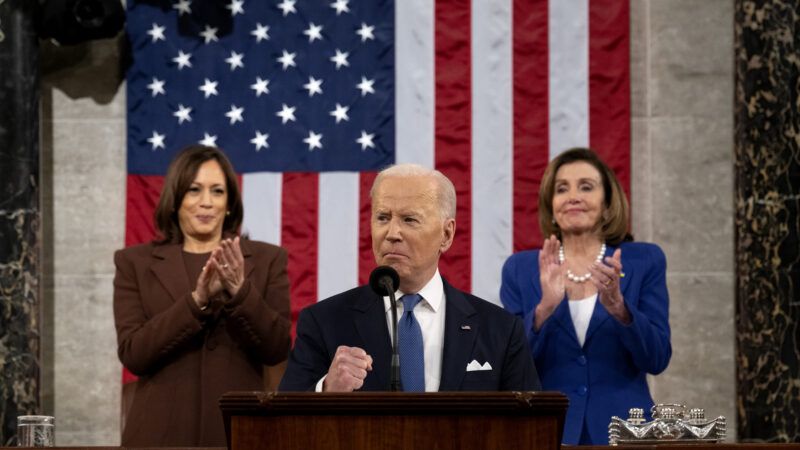Criminal Justice Campaign Promises Absent From Biden's State of the Union Speech
More than a year into the Biden administration, promises to expand clemency, decriminalize marijuana, and end solitary confinement and the federal death penalty remain unfulfilled.

Absent from President Joe Biden's State of the Union speech tonight was almost any mention of the criminal justice reforms that Biden had promised on the campaign trail.
The White House press office pushed out voluminous "fact sheets" throughout the day touting the Biden administration's successes in improving U.S. infrastructure, fighting gun crime, and its plans to curb inflation, but neither the White House nor Biden had much to say about the sweeping criminal justice platform that he ran on.
"Let's come together to protect our communities, restore trust, and hold law enforcement accountable," Biden said in the sole reference to police reforms in his speech. "That's why the Justice Department required body cameras, banned chokeholds, and restricted no-knock warrants for its officers."
Biden's campaign platform included ending the federal death penalty and solitary confinement, decriminalizing marijuana, and using clemency to free federal inmates serving sentences for some nonviolent and drug crimes. More than a year into the new administration, few of those promises have been fulfilled, frustrating criminal justice reform advocates.
It's not particularly surprising that these issues weren't more prominently featured. Biden and Vice President Kamala Harris were both reluctantly dragged by their party to the left on criminal justice issues, and rising murder rates have made many Democrats hesitant to stray too close to any "defund the police" rhetoric. (One of Biden's bipartisan applause lines of the night was calling for putting more police on the streets: "The answer is not to defund the police. The answer is to FUND the police with the resources and training they need to protect our communities.") But the administration's effort to forget some of the more tangible reforms it promised is not a profile in courage.
The Biden campaign promised to "broadly use [the] clemency power for certain non-violent and drug crimes," but the White House has obfuscated and dodged when pressed on when that would happen. Many presidents wait until the final years of their terms to flex their clemency powers. Obama's large-scale clemency initiative didn't really gear up until then. In the meantime, though, there are still federal inmates serving sentences in understaffed, dangerous prisons for nonviolent drug offenses—something that Biden supposedly thinks is an outrage.
Biden halted federal executions last July so the Justice Department could review its death penalty protocols. That moratorium remains in place while the review, apparently, continues.
Other parts of the federal criminal justice apparatus continue to be neglected. A January report from the Brennan Center for Justice noted that the U.S. Sentencing Commission, which sets federal guidelines, has lacked quorum since 2019 because of vacancies on its appointed roster.
Part of Biden's platform to "ensure humane prison conditions" included ending solitary confinement, "with very limited exceptions such as protecting the life of an imprisoned person." Last June, more than 150 organizations sent a joint letter urging the administration to fulfill that campaign promise. As The Appeal reported, a little-noticed section of a draft executive order from the White House leaked last fall would instruct the Justice Department to ensure that inmates were housed in the least restrictive setting necessary. However, other sections of the draft outraged law enforcement groups, and nothing more has been heard about that executive order since.
Criminal justice advocates were successful in convincing the Biden administration to reverse a policy that would have sent federal inmates released on home confinement during the COVID-19 pandemic back to prison, but other wins have been harder to come by.
Qualified immunity reforms died a slow death in Congress and took any chance of a bipartisan policing bill with them. And the Equal Act, which would finally eliminate the sentencing disparity between crack and powder cocaine, is still waiting for a vote on the Senate floor.
The disparity was, of course, created by a bill spearheaded by then–Sen. Joe Biden.
